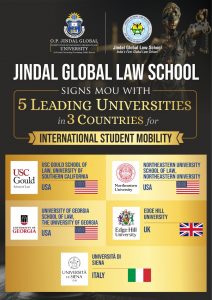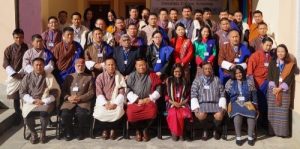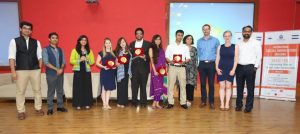New Delhi, December 22, 2018: Expressing deep concern over rising levels of air pollution in the national capital region, experts have called for urgent intervention by the government and citizens to build an awareness about this deadly menace that has grappled the region. These views were stated at a day-long consultation on ‘Air pollution in Delhi NCR: What can be done?’ organised by O.P. Jindal Global University (JGU) with participation from various representatives from the government and academia.
The inaugural session set the stage for deliberations which saw participation from Mr. Vijay Kumar Dev, IAS, Chief Secretary, Government of NCT of Delhi; Hon’ble Mr. Justice Swatanter Kumar, Former Chairperson, National Green Tribunal; Dr. Bhure Lal, IAS (Retd.), Chairman, Environment Pollution (Prevention and Control) Authority; Mr. Naveen Jindal, Founding Chancellor; JGU, Professor (Dr.) C. Raj Kumar, Founding Vice Chancellor, JGU and Professor R. Sudarshan, Dean, Jindal School of Government and Public Policy (JSGP) of JGU.
The speakers reflected on the grave problem with discussions on how the ill-effects of air pollution has spread across the region and how people are suffering massively from it.
In his address, Vijay Kumar Dev, IAS, Chief Secretary, Government of NCT of Delhi pondered on the current issues of pollution in Delhi, the steps to solve the problem and how joint efforts by the government and citizens can curb this issue, “We are the most polluted capital in the world. We have seven agencies protecting laws in Delhi. There is a need of a two pronged strategy to mitigate the issue of air pollution. Currently, there is lack of coordination at various levels – the implementation to the policy level including the coordinated action of various agencies. This leads to impaired efficiency of policy planning and implementation. The combined action should be two pronged. One taking action over governance failure and second on the timelines on action taken on the issues management. The local people including resident welfare association (RWAs) should be empowered and made partners in the enforcement practice. This is going to get an important part of the action plan. The government should take harsh measures wherever required. The consolidated approach will give answers to this thematic seminar. The Delhi government is planning to add 4,000 new buses in 2019 of which 1,000 will be electric.”
Echoing similar views, Hon’ble Justice Swatanter Kumar, Former Chairperson, National Green Tribunal said “We have almost 650 unauthorised colonies in Delhi. There are major challenges pertaining to sanitation and waste treatment. This adds to the overall crisis of environmental degradation. The government cannot act in isolation and needs support from its people. Academia is the best source of bringing anything better in the society. Constitution is supposed to be the biggest legal document which creates everything that we see. Our constitution places an obligation on the citizen through Article 51 A (g) saying that it is the duty of a citizen to protect the natural resources and the environment. Combining these two situation, the Supreme Court creates a golden triangle which is I call as an environmental golden triangle where it says that right to green and decent environment is the fundamental right under article 21 of the constitution of India. No constitution written or oral in the world places environment at such a pedestal. There is a lack of precautionary principals.”
Dr Bhure Lal, IAS (Retd), Chairman, Environment Pollution (Prevention and Control) Authority said “Air pollution has a socio-economic angle to it. Rag pickers burn rubber tyres in winter. Old cars cause damage and the cycle goes on. Our pollution levels need to reduce drastically, almost by 70 per cent to enable us to lead a clean and healthy lifestyle.”
Founding Chancellor, JGU, Naveen Jindal expressing concerns regarding the increasing air pollution in the national capital said, “We are strongly moved by the current alarming scenario and this initiative is a step in finding a sustaining solution. Air quality of the country and especially Delhi is really poor. We think that this is the responsibility of the government but, I believe that this is the responsibility of all of us – the citizens of the nation. We all have to work towards curbing the issue of pollution. The PPM should be below 50 however, the levels of particle in Delhi is above 400, which reduces life span by 10 years.”
“We need an informed understanding of air pollution and its problems to arrive at the solution. Japan, Korea, China and the West have set amazing examples to curb this menace and it’s our turn now to make Delhi pollution free. We really wish to be a society that respects the environment. The first and foremost step that we have to take is to change the way of life and develop the essence of collective consciousness so that people become much more environment sensitive. We need to highlight the major sources of environmental degradation and come up with effective solutions. We will be partnering with the government, providing intellectual support and come up with effective solutions that can reach to the implementation stage”, opined, Vice Chancellor, JGU, Prof.(Dr) C. Raj Kumar.
Stressing on the role of academicia and student led initiatives, Professor R Sudarshan, Dean, JSGP highlighted JGU’s initiative to address the crisis of crop residue burning. He said, “JGU has allocated special research grants to students and faculty. They will interact with farmers in JGU’s neighbourhood and work to create sustainable environmental friendly models.”
Lieutenant Gen A. K. Singh, Advisor to JGU, reiterated on the proactive role educational institutions can play championing the cause of clean air said, “The whole idea of the seminar is to bring experts together from the field and implement a road map on a priority. We all have to contribute our bit towards a healthy living in Delhi. It is now or never.”
The day long consultations saw empirical data being shared and multiple reflections on curbing and chalking out a sustained strategy on air pollution. Some of the key participants were Mr. Laveesh Bhandari, Indicus Foundation, New Delhi; Mr. Polash Mukherjee, Centre for Science and Environment (CSE), Delhi and Mr. Ajay Shankar, Distinguished Fellow, The Energy and Resources Institute (TERI), New Delhi.



